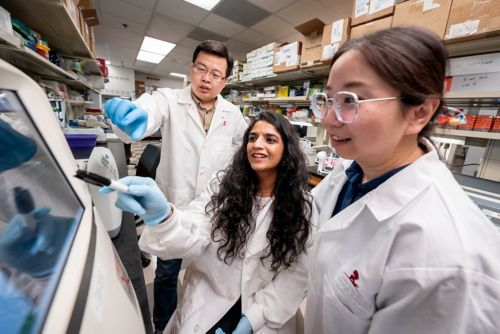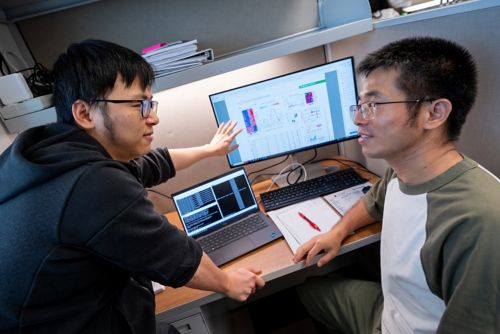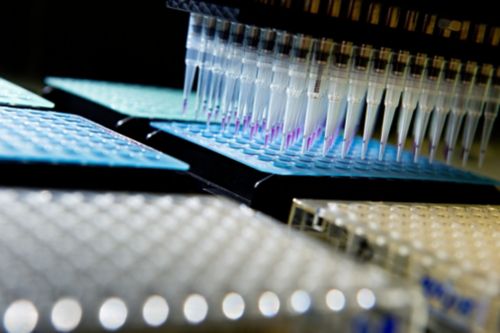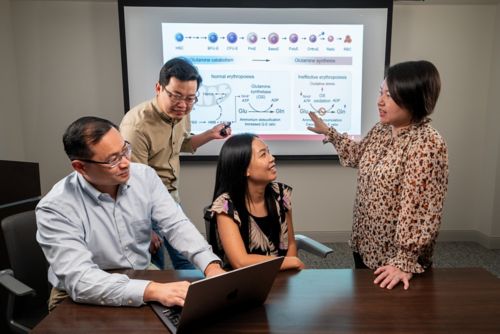St. Jude Family of Websites
Explore our cutting edge research, world-class patient care, career opportunities and more.
St. Jude Children's Research Hospital Home

- Fundraising
St. Jude Family of Websites
Explore our cutting edge research, world-class patient care, career opportunities and more.
St. Jude Children's Research Hospital Home

- Fundraising
Jian Xu Lab
Understanding the gene regulatory and metabolic processes in normal development and blood disorders
Overview
The origins of cancers and inherited blood disorders are often rooted in the dysregulation of genes, highlighting the importance of understanding the fundamental processes controlling gene expression in health and disease. However, gene regulation is highly complex due, in part, to the involvement of numerous regulatory elements and the influence of epigenetics and metabolism. Our lab is interested in understanding gene regulation and functional metabolism in the context of stem cell development in normal and neoplastic blood cells. Through these studies, we aim to develop innovative strategies to precisely modulate gene function to aid in treating blood disorders.

Xu research summary
Cellular identity is dependent on gene expression programs, and the maintenance of this identity relies on the proper control of gene expression in space, time and magnitude. However, gene regulation can be altered, which can cause cancer or inherited blood disorders.
Our lab investigates the fundamental mechanisms governing gene regulation and metabolism in normal and cancer stem cells. Using molecular biology, genome engineering, disease modeling, single-cell technologies, and computational biology, we study key regulators of gene expression, with a particular focus on enhancers, epigenetics, and intracellular metabolism. By dissecting the regulatory networks of normal and neoplastic hematopoiesis, we aim to uncover the underlying causes of devastating blood disorders.

Epigenetics-metabolism crosstalk in development and cancer
The interplay between epigenetics and metabolism in normal development is well established, but how these processes interact to drive cancer progression remains poorly understood. Our laboratory demonstrated that epigenetic alterations, such as EZH2 inactivation, a histone methyltransferase, disrupt intracellular metabolism in leukemia-initiating cells, providing direct evidence that epigenetic dysregulation can fuel cancer development.
We aim to further dissect the relationship between epigenetics and metabolism in blood cells, particularly in disease states. Our current focus includes investigating branched-chain amino acid metabolism in stem cell function and cancer progression, as well as identifying metabolic dependencies of cancer stem cells as potential therapeutic targets.

Metabolic control of normal and pathological hematopoiesis
Research on metabolism holds immense potential for revealing fundamental biological insights, novel disease mechanisms, and therapeutic targets. However, therapeutic advancements remain limited due to an incomplete understanding of metabolic regulation in both normal and pathological conditions.
Using state-of-the-art metabolomics and stable isotope tracing in advanced disease models and human specimens, we identified post-transcriptional pathways that regulate mitochondrial biogenesis and metabolism during erythropoiesis. We also elucidated metabolic adaptations driving acquired resistance to IDH-targeted therapies in myeloid leukemias. More recently, we uncovered a glutamate-to-glutamine metabolic switch essential for ammonium detoxification during erythropoiesis, which may be leveraged to mitigate common red cell disorders.
Our ongoing studies focus on characterizing the metabolic properties and vulnerabilities of blood stem cells, developing erythrocytes, and leukemia cells across experimental models and disease states. Ultimately, we aim to develop metabolism-targeted strategies to improve disease management and therapeutic outcomes.
Enhancer biology
We study how gene expression shapes cell identity by focusing on enhancers—short, cis-acting DNA sequences that promote transcription and influence cell fate. While transcription factors modulate cis-regulatory elements, the precise mechanisms governing enhancer regulation and spatiotemporal gene expression remain unclear.
Our lab investigates the regulatory logic of enhancer function in both normal development and disease. To this end, we have developed novel technologies that integrate repurposed CRISPR/Cas9 systems, functional genomics, and optogenetics. These approaches enable us to uncover chromatin-based mechanisms governing non-coding elements like enhancers, isolate regulatory complexes, and study their functions.
Currently, we focus on enhancer hijacking in cancer genomes, functional and mechanistic analyses of pathogenic non-coding variants, and advancing technologies for dissecting genome structure and function.
System biology of disease-associated non-coding genome
About 99% of human DNA is non-coding, yet these elements can influence the development and outcome of human disease. While retrotransposons, repetitive transposable elements, are traditionally seen as cancer-promoting, our laboratory recently uncovered their tumor-suppressive role in myeloid leukemia, underscoring the complexity of non-coding genomic elements in disease. Deeper insights into these dynamics could drive novel therapeutic strategies.
We are developing experimental and computational approaches, integrated with in vitro and in vivo disease models, to study disease-associated non-coding elements at a systems level. Our current projects focus on oncogenic cooperation between coding and non-coding variants, integrative analysis of structural variants as cancer drivers using long-read sequencing and elucidating the functional roles of transposable elements in cancer genomes.
Publications
Contact us
Jian Xu, PhD
Member, St. Jude Faculty
Department of Pathology
MS 345, D4063D
St. Jude Children's Research Hospital

Memphis, TN, 38105-3678 USA GET DIRECTIONS
